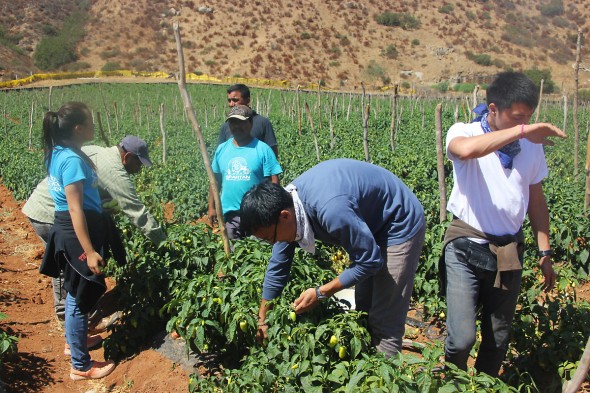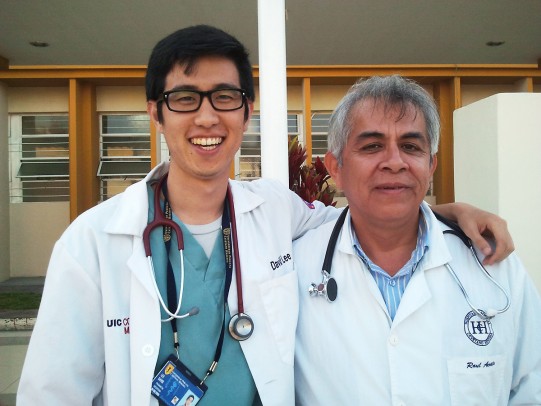GMED trains medical students to practice without borders

Tim Lee (in white shirt on right), a student in the Global Medicine program, works with migrant farmworkers in the field in San Talmo, Baja California, Mexico.
When David Lee was applying to medical schools, UIC College of Medicine was one of many he considered.
“But when I heard about the GMED program, that catapulted UIC to the top of my list,” said Lee, now a second-year student.
GMED — Global Medicine — now in its second year, is offered to incoming medical students through a separate application and interview.
In addition to the regular medical curriculum, GMED students take coursework and classes that focus on global health. They travel to other countries over two summers and produce a senior capstone project.
Lee traveled to Peru this past summer, where he worked in the emergency department of a public hospital in Lima and helped place sensors along the Amazon River to monitor water quality.
“Global health is a bit hard to define because it encompasses so much, but in a nutshell, it is about the wellbeing of populations without respect to borders,” said Valerie Dobiesz, professor of clinical emergency medicine and GMED director.
GMED is “the crown jewel and life blood” of the UIC Center for Global Health, says Tim Erickson, professor of emergency medicine and center director.
One of only a few global health programs offered at medical schools in the United States, GMED has been popular from the beginning, Erickson said.

GMED student David Lee with physician Raul Acosta at Universidad Peruana Cayetano Heredia in Lima, Peru, where Lee worked last summer.
“The first year we offered the program, we accepted 13 students, thinking that at least one would decline and get us to our target number of 12, but all 13 students accepted,” Dobiesz said.
Lee, who grew up in Argentina and speaks fluent Spanish, became interested in global medicine as an undergraduate philosophy and chemistry major at Vanderbilt University.
He was asked to translate for a patient visiting the university clinic and the experience made him realize, “I’m in a position to give.”
Tim Lee (no relation), also a second-year GMED student, started going on annual international volunteer service trips with his family when he was 12.
The family made multiple visits to San Telmo in Baja California, Mexico, a farming community of migrant workers. Lee wants to focus on the town in his work as a GMED student.
“I am interested in doing a longitudinal study of the medical needs of the community based on the people who live and work there,” Lee said.
He spent last summer in San Telmo talking to clergy, workers and farm managers about their health needs. He even spent a day picking jalapenos in the field.
The people he met there have a mix of health concerns and problems related to accessing health care, Lee said.
“There are water and sanitation issues that cause a lot of gastrointestinal disease, and tuberculosis is also much more common than what we see in clinics back home (in Chicago),” Lee said.
“Their health care system is free, but the barriers to access are high. So there’s a mix of needs that is particular to this area.”
Lee plans to return to San Telmo in 2014 to do a formal survey of the community to assess needs and resources available.
“Every GMED student has a story to tell,” Dobiesz said.
For more about the GMED program, email Dobiesz at vneylan@uic.edu.
